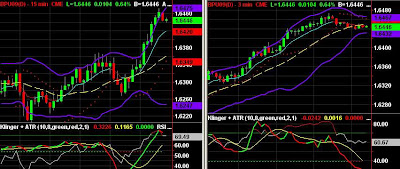 The Pound is getting pounded today.
The Pound is getting pounded today.
from FT.com:
Not since 1958 has the quarter-on-quarter decline in GDP been greater, while the 4.9 per cent drop compared to a year earlier was the largest since records began in 1948.
“‘You’ve never had it so bad’ seems the most apt summary of the state of the UK economy in Q1,” said Ross Walker, economist at RBS. “Although to some extent this is ‘old news’, it does serve to emphasise the size of the hole out of which the UK must climb.”
The precipitous decline in GDP in the first quarter reflected the fallout after the credit crisis escalated dramatically from September of last year onwards and highlights the depth of the recession that the UK has been suffering.
But since the end of the first quarter there have been growing signs that the economy is stabilising. Manufacturing output actually grew in March and April, while survey data suggested the economy has returned to growth.The respected economics thinktank, the National Institute for Economic and Social Research, said it thought the economy began to grow again in April.
“The survey data suggest we have at least stopped digging, but the economy remains on course for a lacklustre pace of recovery,” Mr Walker said.
The Bank of England has warned that the economy faces a slow recovery, as banks remain fragile and lending weak.
The output of the construction was revised down to show a 6.9 per cent decline from the first estimate of a 2.4 per cent drop. However, the fall in output was actually less severe than the 9 per cent fall that a more recent ONS revision had suggested, which had led many to expect GDP to be revised down sharply.
Services output, which makes up about three quarters of the UK economy, was revised down to see a drop of 1.6 per cent rather than the 1.2 per cent orginally reported.
“Revisions to GDP are larger than usual, reflecting greater uncertainty in measurement during a period of rapid change in economic activity,” the ONS said.
The GDP figures confirmed that the recession began in the second quarter of last year, after the economy shrank by 0.1 per cent in the April to June period, rather than the 0.0 per cent decline originally reported.
The economy contracted by 4.9 per cent from its peak in the first quarter until the first quarter this year. That is worse than the 2.5 per cent drop in the 1990s recession, but less than the 5.9 per cent fall in the early 1980s recession.
Despite the dramatic contraction in the economy rating agency Fitch reconfirmed the top triple-A rating on the UK’s sovereign debt at stable - along with the US, France and Germany - refusing to follow rival Standard & Poor’s which recently changed the UK’s debt outlook to negative.
The household saving ratio fell to 3 per cent from 4 per cent in the final quarter of last year, as households’ real disposable income dropped by 2.4 per cent due to lower earnings, but consumption did not fall as sharply.
Business investment fell by 7.1 per cent during the quarter. Inventories made a smaller drag of 0.4 percentage points out of the 2.4 per cent fall in GDP, compared to the previous estimate of 0.6 percentage points.
“The UK national accounts ... underline the fact that the economic recovery is built on very fragile foundations,” said Capital Economics.
“With the annual rate pulled down from -4.1 per cent to -4.9 per cent, average GDP growth in 2009 now looks likely to be -4 per cent or weaker rather than the -3.5 per cent we previously expected.
“Note too that the breakdown is not pretty, with the renewed fall in the household saving ratio from 4 per cent to 3 per cent underlining that the adjustment in the household sector has a long way yet to go.”
Not since 1958 has the quarter-on-quarter decline in GDP been greater, while the 4.9 per cent drop compared to a year earlier was the largest since records began in 1948.
“‘You’ve never had it so bad’ seems the most apt summary of the state of the UK economy in Q1,” said Ross Walker, economist at RBS. “Although to some extent this is ‘old news’, it does serve to emphasise the size of the hole out of which the UK must climb.”

















